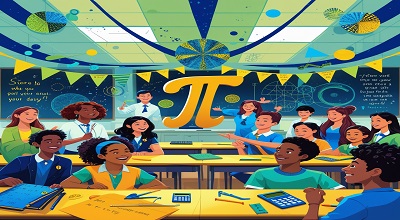Celebrating Pi Day Across the Curriculum
Celebrating Pi Day Across the Curriculum: Pi Day, celebrated annually on March 14th (3/14), is more than just a fun nod to the mathematical constant π (pi). It’s an opportunity to engage students across various subjects—math, science, history, art, and even language arts—with creative, hands-on activities. At teacheducator.com, we believe in making learning interdisciplinary and exciting.
In this comprehensive guide, we’ll explore:
- The history and significance of Pi Day
- Engaging math activities to celebrate π
- Cross-curricular Pi Day lessons (science, art, music, and more)
- Technology integration for Pi Day
- Assessment and reflection ideas
- Frequently Asked Questions (FAQs)
The History and Significance of Pi Day
What is Pi?
Pi (π) is the ratio of a circle’s circumference to its diameter, approximately equal to 3.14159. It’s an irrational number, meaning its decimal representation never ends or repeats.
Why March 14th?
March 14th (3/14) was chosen because the first three digits of π are 3.14. The day was officially recognized by the U.S. House of Representatives in 2009 to promote math education.
Fun Fact:
Albert Einstein’s birthday is also on March 14th, making Pi Day doubly special for science enthusiasts!
Math Activities for Pi Day
1. Pi Digit Memorization Challenge
- Students compete to recite the most digits of π.
- Use mnemonic devices (e.g., “How I wish I could calculate pi…”).
2. Circle Measurements
- Have students measure the circumference and diameter of circular objects (plates, lids, etc.).
- Calculate π using their measurements.
3. Pi Art (Graphing π)
- Plot the digits of π on a coordinate plane to create visual art.
Cross-Curricular Pi Day Lessons
Science: Exploring Pi in Nature
- Discuss how π appears in natural phenomena (ripples, planetary orbits).
Language Arts: Pi-Ku (Pi-Themed Haiku)
- Write haikus with 3 syllables in the first line, 1 in the second, and 4 in the third (3-1-4).
Music: Pi Songs
- Create musical rhythms based on π’s digits.
History: The Evolution of Pi
- Explore how ancient civilizations (Egyptians, Babylonians) approximated π.
Technology Integration
Coding Pi Calculations
- Use Python or Scratch to compute π using different algorithms.
Virtual Pi Day Celebrations
- Host online quizzes, escape rooms, or collaborative projects.
Assessment and Reflection
- Exit Tickets: Ask students, “What surprised you about π?”
- Project-Based Assessments: Have students present their Pi Day projects.
5 FAQs About Pi Day
1. Why is Pi Day important in education?
Pi Day makes math engaging and shows real-world applications of π.
2. How can non-math teachers participate?
Art, history, and music teachers can incorporate π creatively.
3. What are some virtual Pi Day activities?
Online scavenger hunts, digital pie-making contests, and coding challenges.
4. Can younger students celebrate Pi Day?
Yes! Use simple circle activities and storytelling.
5. Where can I find Pi Day resources?
Check out teacheducator.com/resources for lesson plans.
Conclusion
Pi Day is a fantastic way to foster interdisciplinary learning and student engagement. Whether through math puzzles, art projects, or tech challenges, there’s something for every classroom.
